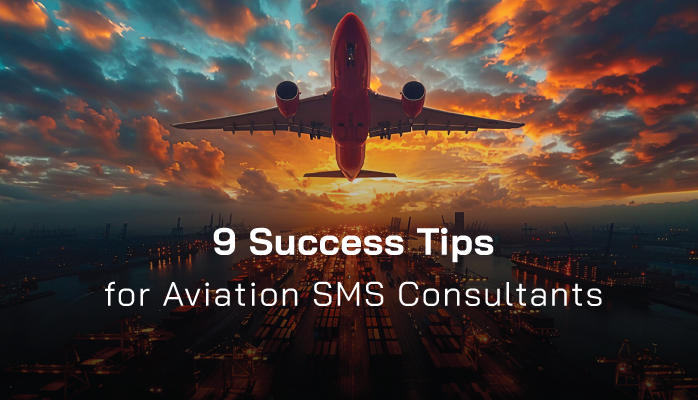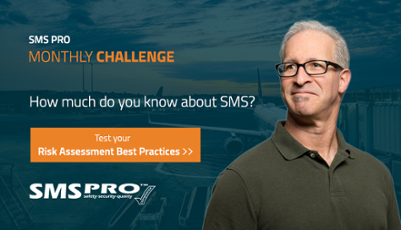The Glamour of Aviation SMS Consulting

Aviation safety management systems (SMS) are viewed as complex systems comprised of multiple, interdependent subsystems. These subsystems include, but are not limited to:
- Safety reporting system;
- Risk management system;
- SMS training management system;
- Safety communication system(s); and
- Safety performance monitoring systems.
As we can see, this collection of interdependent systems can make an SMS implementation appear more complicated than necessary. How can newly assigned safety managers quickly learn these concepts and apply them in their organizations? This is the role of the SMS consultants, who provide guidance and training.
Related Articles on Aviation SMS Consulting and Training
- Independent Aviation SMS Consulting - Pros and Cons
- What Is Aviation Safety Training in Aviation SMS - Includes Videos to Use
- 3 Biggest Aviation SMS Training Course Mistakes
SMS Consultants May Not Possess Previous Safety Experience
SMS consultants help aviation service providers understand the challenges and opportunities presented by their aviation SMS implementations. The November 2006 ICAO mandate for formal SMS implementations has naturally created a demand for qualified professionals who can travel to remote, tropical (or arctic) locations and provide SMS guidance. Some SMS consultants have become successful, while others relegate themselves to sitting in the office waiting for the phone to ring.
Becoming an SMS consultant has a certain glamour that seems to attract many aviation professionals who may have not had previous career paths dedicated to aviation safety.
Granted, there are many fantastic benefits of being an aviation SMS consultant, namely:
- It can be extremely lucrative;
- You get to be your own boss;
- The landscape is always changing due to servicing different clients with differing needs;
- You travel to exotic locations to meet and train clients from different cultures; and
- You get to be the expert as you consult and provide aviation SMS training.
Challenges Faced by Aviation SMS Consultants
Of course, there are downsides to becoming an SMS consultant. These not-so-glamorous elements include:
- High competition in developed countries;
- Unqualified SMS consultants poisoning the efforts of the bonafide consultants;
- Inconsistent work schedules (feast or famine);
- Attracting the "right kind" of clients;
- Dealing with many tire-kickers looking for free or highly discounted consulting services;
- The stress of constant networking; and
- Staying abreast of the latest developments in the aviation SMS arena.
For those who are ready to jump the gun and dive into it, we will discuss 9 useful aviation SMS consulting tips to increase your chances of success.
Related Aviation SMS Training Articles
- 10 Things You Need to Know About Aviation Safety Training
- 6 Tips to Improve Aviation SMS Training Courses
- 3 Top Topics for Aviation SMS Training to Focus On
1 – Get an Advanced Degree or Be an Expert
To be a successful aviation SMS consultant, you have to be the go-to person for "all things SMS." In other words, you need to be an expert in implementing formal safety programs that comply with regulatory requirements. Being an expert means:
- Being a thought leader for your area of SMS;
- Knowing best practices for optimizing aviation safety performance;
- Remaining current on aviation SMS compliance requirements; and
- Having a broad knowledge of safety management system resources.
Getting an advanced degree in Safety Management Systems, for example, can catch you up on the most current philosophies and ideas that will drive the future direction of SMS. This certainly isn’t required, but:
- It looks great on a resume; and
- Gives you plenty of networking opportunities.
Regardless of whether you choose formal education or not, the point is that your success as an SMS consultant depends considerably on how well you can outshine other consultants and attract the right kind of clients.
How do you know you are ready to become an SMS consultant? After you have received your SMS training, do you feel comfortable training other groups on the fundamentals of aviation SMS implementations? There is a saying that "You don't truly understand a subject unless you can teach the subject." The same applies to guiding others on implementing an aviation SMS.
2 – Know What You’re Good and Bad At

Aviation safety managers who delegate extremely efficiently have two things in common:
- They have a “can-do” attitude; and
- They delegate tasks extremely well.
To do either point effectively, you have to know where you perform better than others, and where you need help. It’s an odd mix of being confident and humble at the same time. Bringing these two abilities to your life as a safety management consultant will ensure that you don’t step on your own toes, and it will allow you to be upfront and clear on exactly what you can bring to the table.
Know your strengths. Know your limitations!
Moreover, knowing where you don’t perform well is also a great opportunity to bring other professionals into your “inner circle” for help – thus building a well-rounded team. So, if you want to be an SMS consultant, take a hard look in the mirror and be honest. Which areas of an SMS implementation are your strong points? What are your strong points? In this context, we are referring to several, common core SMS principles, including:
- Safety culture;
- SMS data management;
- Laying the framework to organize the new aviation SMS;
- SMS training (executive level and line level); and
- Safety performance monitoring strategies.
Related Aviation SMS Implementation Articles
- Why Should We Implement Aviation SMS?
- How to Create Aviation SMS Implementation Plan - With Templates
- How to Sustain an SMS Implementation (With Free Resources)
3 - Have a Backup Plan
I realize this seems terribly defeating, and in fact, some people will say the exact opposite – that having no fallback plan will motivate you to succeed. I think having a backup plan for being an aviation SMS consultant is a good idea for several reasons:
- It’s safer and reduces your risk (after all, SMS is designed to manage risk);
- It allows you to focus your energy on learning SMS implementation concepts and your interpersonal performance (rather than being stressed out about “making it work”); and
- Protects you from safety management burnout, which too much pressure will do very quickly.
I’ve known SMS managers who took one or two tries at being an SMS consultant before making it stick comfortably. If anything (I would be curious to hear your thoughts as well), the trend seems to be drifting in and out of consulting practice depending on whether the person’s current goal, whether the goal is:
- Stability;
- Professional challenge;
- Making money;
- Maintaining professional networks;
- Travel; or
- Keeping your mind sharp from constantly learning and moving.
4 - Build Your Network (Reputation) Before/During Consulting
In the consulting world, your reputation means everything. Thus, you will most likely be a professional networker. Every contact is a potential client, a potential source for growing your reputation. Building your network base before consulting will make the move into SMS consulting much easier.
Even as a consultant, taking time to network and maintain a professional report with many people in your industry will also give you more options to create the kind of working lifestyle that best suits your professional interests. The most obvious types of people to network with within an aviation organization include:
- CEO;
- Upper-level managers;
- Quality assurance staff (auditors); and
- Safety managers.
Safety managers are very important, as they may be your primary company contact during client relations. Safety managers are typically the company representative who seeks out aviation SMS consultants. Therefore, it is wise to understand challenges and solutions directly related to making the jobs of safety managers easier.
Related Aviation Safety Manager Articles
- What Is a Safety Manager in Aviation Safety Management Systems (SMS)?
- What Makes a Good Aviation Safety Manager?
- 5 Types of Aviation Safety Managers
5 – Build Resources Before Consulting
As aviation safety management systems grow in complexity and size, having SMS tools to cut through as many redundant, time-consuming, and manually laborious tasks is absolutely critical for being a good aviation SMS consultant. Every minute you spend manually entering data or repeating tasks is time spent away from more pressing responsibilities. Resources can be:
- SMS software;
- Automation tools;
- SMS Database tools;
- Checklists; or
- Knowledge centers (i.e., articles, books, contacts).
But building SMS resources is not just about you as a consultant. Even more importantly, the basic fact is that each organization is a unique and potentially complex operator, and you will need access to many different types of tools to satisfy those unique needs. Building resources is a process of:
- Knowing about the best SMS resources;
- Having access to them; and
- Being able to provide them to clients at a moment’s notice.
When you have access to a plethora of the best resources, you will naturally position yourself as an indispensable resource gate for any operation you decide to consult with.
6 - Acquire Effective Task Management Tools
As said, the ability to delegate and manage tasks will play an absolutely critical role when it comes to being a good aviation SMS consultant. You may have many clients who need your regular attention, and if you’re not prepared, things can quickly get out of hand. Talk about a reputation killer.
There are countless task management tools out there, such as Trello and GMail's integrated Calendar and Tasks. The point is to:
- Develop and constantly critique your client management workflows; and
- Find the task management tools that work for your workflow and activity levels.
As an aviation SMS consultant, you may be serving as a "contracted safety manager." In this case, you should become familiar with the strengths and weaknesses of the various aviation SMS database tools on the market. An aviation SMS database tremendously increases a safety manager's level of professionalism and reduces time on recurring risk management tasks.
Familiarization with various SMS databases also becomes useful to aviation SMS consultants when they are recommending SMS data management strategies to clients. Each aviation SMS database has its niche market(s), as well as suitability based on the size of the operator. Every SMS consultant can be expected to offer SMS database recommendations, so you should be prepared.
Related Aviation SMS Database Articles
- What Is an Aviation Safety Database for SMS Implementations?
- How to Choose the Best Aviation Safety Database Software
- 5 Most Important Things to Know Before Buying Aviation SMS Database
7 – Know Your Worth as an SMS Consultant
Knowing your worth as a consultant will dictate your interactions with clients from the beginning of your client relationships. Knowing your worth as an aviation safety consultant means:
- Charging fees that are on par with your performance ability (in relation to other consultants' fees);
- Reinforcing your sense of “can-do” when things get rough (and they will at times); and
- Having a strong sense of the before mentioned strengths/weaknesses recognition.
Knowing your worth isn’t a static “know how good you are.” It means knowing what you are and aren't worth, and when and where you are worth it.
8 – Remember That You Work for Yourself
Aviation SMS consultants have to walk a fine line in the relationships they form with clients. On the one hand, they need to be thoroughly trusted and respected, but they also need to maintain a certain amount of distance from clients.
Consultants get paid a premium, and with respect to these high-priced fees, managers at companies will tend to be more critical of their consultant’s behavior and level of professionalism. Some distance is critical for consultants to maintain their professional image and reinforce their role as specialists.
9 - Wait for Retirement
This might seem like uninspiring advice – so take it with a grain of salt. I only mention this because consulting during retirement can be a fantastic way to continue your career in aviation SMS with reduced pressure to perform daily. Furthermore, you will possess a career’s worth of
- contacts,
- tools,
- SMS resources, and
- invaluable experience.
When you are retired and consulting as a "part-time hobby," you get to be more selective. You can work only with the airports, airline operators, and clients that best fit your preferences and with those that can afford your consulting fees. Moreover, you can comfortably walk away at any time.
If you think that waiting for retirement is not suitable for your timeline and that you are "missing the boat" to start your SMS consulting business, don't become alarmed. There are still many operators who need help with their SMS implementations. Many operators have only a "paper SMS," where they may be able to check the box, but their SMS is not performing. This is an opportunity.
With this in mind, don't worry about lack of opportunity. There are startups and operators with underperforming SMS implementations that require help.
Related Aviation SMS Implementation Articles
- Overview of 4 Phases of Aviation SMS Implementation With Free Resources
- Implementing Aviation SMS for Small Providers
- SMS First Steps - How to Create an SMS Implementation Plan
Final Thought: Costs/Benefits of Being an Aviation SMS Consultant
There’s no doubt that aviation SMS consulting comes with some fabulous benefits, including the fact that it can be very lucrative and you are able to work for yourself. That being said, it can also be inconsistent and stressful work.
The basic fact is that SMS consulting will probably fit you better at different points in your personal life and professional career. That being said, if you have an interest, wait for the right opportunity and jump on it.
Are you an SMS consultant? Have any other tips for success?
Aviation safety consultants have to be familiar with the best aviation SMS tools in order to offer solid advice to their clients. Are you familiar with SMS Pro's features, such as:
- Hazard Reporting;
- Risk Management;
- Safety Performance Monitoring; and
- Safety-Quality Assurance?
Last updated in February 2025.









